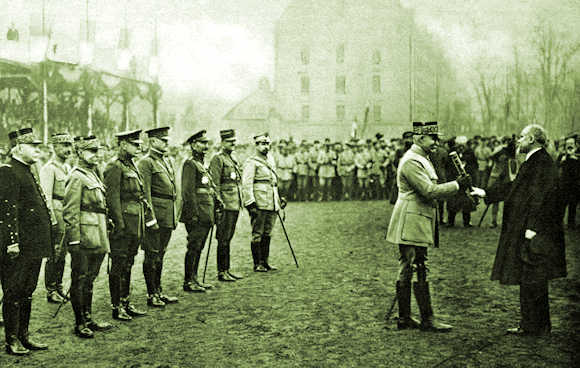 |
| Medallion Commemorating the Liberation of Metz, 19 November 1918 |
At the onset of World War I, Metz was considered one of the most formidable strongholds in the world. Paradoxically, the city was spared from combat during the war except for some aerial bombardment of its train yards in the last months of the conflict. The German garrison reached 25,000 before the First World War. Before the war it was a desirable location for the German military, especially its career officers, many of whom moved their families to Metz during their assignments. For the heavily French civilian population, however, it was a different matter, especially when war broke out.
Before the war the Germans had drawn up "black lists" in which were recorded numbers of manufacturers, political men, journalists, priests, and members of Lorraine societies. The inhabitants of Metz were not spared in these lists; many were arrested on the suspicion of exercising "a provocative action and a pernicious influence over the population." Before mobilization had begun or hostilities declared, the "suspects" were forcibly torn from their families and confined in cells, without trial, in the military prison of Metz.
The Germans subjected Metz to a regime of terror. The German inquisition was not confined to the street; it intruded into the homes. Everything that reminded them of France—books, sacred family relics—had to disappear. Speaking French became a provocation. All the French newspapers were suppressed, and only the official German papers were allowed and a system of spies and informers was widespread. Orders were given to celebrate the "great German victories."
 |
| 19 November 1918: Marshal Foch Leads the 39th Division into Metz |
By late 1918, the inhabitants of Metz felt that the end was near. Hunger held the German population in its grip, though the natives of Metz managed, by every known and unknown ruse, to conceal food that their friends in the country obtained for them almost under the noses of the police. The people of Metz knew that they were certain of becoming French again and were awaiting their liberation.
When the Armistice was signed on 11 November 1918, the American artillery was within range of the forts of Metz, which they had already bombarded several times, and the troops were all in position for the offensive fixed for 16 November that proved unnecessary. By the termis of the Armistice, invaded countries, including Alsace and Lorraine, had to be evacuated. So, on Tuesday 19 November 1918, French troops made their solemn entry into Metz, evacuated by the German soldiers, amid scenes of indescribable enthusiasm. Salvos of guns and the sounding of the bell known as "Mutte" in the cathedral heralded this festive day.
 |
| The Statue of Kaiser Wilhelm I Toppled, Later Replaced with a French Poilu |
On the following Sunday, 24 November , the chief men of Metz appointed the new municipal council and decided that the streets should revert to the names they held before 1870 and that the new streets should be named after generals and great men who had distinguished themselves during the war. The list was settled by a by-law on 7 December.
On Sunday, 8 December, President Poincaré, with a retinue consisting of the Minister for War, the president of the Council, Georges Clemenceau, the presidents of the Chambers, ministers, marshals, and French and Allied generals came to announce the definite restoration to France of the lost provinces.
 |
| Poilus Welcomed by Local Ladies at the Cathedral |
It was an unforgettable day. Girls in Lorraine costume lined the streets, and flowers were thrown from windows onto the procession. The review took place in the morning on the Esplanade, as did the presentation of the marshal's baton to General Pétain. The ceremony was opened with a speech by the president.
Then followed a touching scene, when M. Poincaré and M. Clemenceau approached each other and joined in a long embrace after decades as political opponents.
 |
| President Poincaré Presents Pétain His Marshal's Baton. Watching from the Left, Joffre, Foch, Haig, and Pershing. |
In the afternoon there was a reception at the Hôtel de Ville when President Poincaré conjured up the history of Metz, concluding thus :
The years have passed on Metz, and Metz has not changed. The protests which her great Bishop, Monsignor Dupont des Loges, used formerly to carry to the Reichstag in the name of all the people of Metz, in the name of all the inhabitants of Lorraine, have continued after his death. With the same quiet firmness, you, inhabitants of Metz, hâve repeated them, year by year, in your pilgrimages to Mars-la-Tour. in your visits to the cemeteries, in your worship of the memory of France. "Beloved town of Metz, your nightmare is over, here is France back again opening her arms to you.
 |
| The Famous Poincaré–Clemenceau Embrace |
On 27 October 1919, the Croix de Chevalier de la Légion d'Honneur was bestowed on the town of Metz with the following inscription :
The town whose persistent loyalty to France never faltered during a captivity of 48 years ; Rich in a past glorious and without stain, unsullied by her misfortunes, exposed for centuries to the covetousness of a near enemy, she has richly deserved to be honoured because she has suffered so long. She symbolizes, in her deep affection for her Mother country. Lorraine, at last wholly restored as a French province.
Source: Michelin Guide for Verdun and Argonne-Metz, 1914-1918

No comments:
Post a Comment